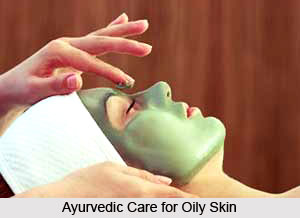 Oily skin needs special care as it might cause several other problems. Hormonal imbalance occurs in adolescence period that is the main cause of oily skin. This is the commonest skin type among teenagers. More oil is secreted during teenage and the oil secretion reduces with the advancement of age.
Oily skin needs special care as it might cause several other problems. Hormonal imbalance occurs in adolescence period that is the main cause of oily skin. This is the commonest skin type among teenagers. More oil is secreted during teenage and the oil secretion reduces with the advancement of age.
Hormonal imbalance also appears during pregnancy and menopause. This might lead to increase of oil secretion from the oil glands of skin. Sometimes contraceptive pills and cosmetics also increase the natural oil secretion. Humidity and hot weather are two natural conditions that increase oil secretion from skin. The oil secreting glands of skin becomes overactive and thus produces much oil. The excess oil thus oozes out and gives the skin a shiny greasy look and due to the enlarged pores the skin looks coarse.
According to Ayurveda the qualities of skin are determined by tridoshas. The dosha, which is dominant in skin, determines the quality and type of the skin. When Kapha dosha is dominant, the skin is oily, shiny and soft and the complexion of the skin is very glowing. Wrinkles develop at the older age of life. When kapha dosha is imbalanced the skin pores get enlarged and acne pimples start to appear.
There are many problems that might aggravated by the oily skin like enlarged pores, black heads, acne and pimples, coarse texture of skin etc, Sometimes skin becomes darker due to more oiliness and more prone to moist eczema. The fungal infections are also very common problem in case of oily skin.
Ayurveda has several remedies to cope up with the problems of oily skin. Ayurveda suggests washing the skin with plenty of warm water (2-3 times a day) and mild soap or herbal scrub to prevent the clogging of the pores. One should not wash the skin too much as excessive washing causes overproduction of oil to compensate the loss. While washing the face, one should avoid using harsh chemicals to remove oil, as some amount of natural oil is needed to maintain the good texture of the skin.
Hot water should be used to wash the face as it dissolves the oil that clogs the pores and also balances kapha. The oil-free moisture should be used in case of oily skin. Sticky make up should be avoided that clogs the pores. Half spoon of lemon juice and half spoon of cucumber juice can be applied to the face thirty minutes before taking the bath. Equal parts of lemon juice and water can be mixed to apply on the face and then the face should be rinsed with warm water first and then followed by cold water after it is dried. Heavy food or deep fried food or fatty food should be avoided.
Also cheese and sugar rich deserts should not be taken. Light well-spiced food balance kapha dosha and the foods that cause constipation should be avoided. Inclusion of ginger, pepper and long pepper in diet is very helpful. Regular exercise removes the skin toxins and thus useful to solve the problems of the oily skin. Plenty of leafy green vegetables and fresh fruits are always helpful to rejuvenate skin problems. And last but not the least, excessive consumption of soft drinks, alcohol, tea, coffee and chocolates should be avoided.




















